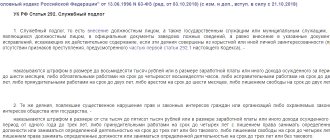ST 276 of the Criminal Code of the Russian Federation.
Transfer, collection, theft or storage for the purpose of transfer to a foreign state, international or foreign organization or their representatives of information constituting a state secret, as well as transfer or collection on the instructions of foreign intelligence or a person acting in its interests, other information for use against security Russian Federation, that is, espionage, if these acts were committed by a foreign citizen or a stateless person, are punishable by imprisonment for a term of ten to twenty years.
Commentary to Art. 276 Criminal Code
1. Depending on the subject of the crime, two types of espionage are distinguished: a) espionage, the subject of which is information constituting a state secret; b) espionage in relation to other information not related to state secrets. In the latter case, the subject is other information, including open access (soil and water samples, a selection of scientific data, etc.).
2. The objective side is expressed in the form of actions that are performed in favor of a foreign state, international (governmental or non-governmental) or foreign organization or their representatives. Transmission of relevant information means communicating it, bringing it to the specified addressees through personal contact, the use of messengers, electromagnetic installations, hiding places, etc. Collecting this information means searching, discovering information by any means for the purpose of recording it, further reproducing it and (or) taking possession of it. It can be carried out through visual observation, eavesdropping, radio interception, photography and video recording, copying documents, obtaining samples of certain substances, etc. Theft is the unlawful, gratuitous seizure of restricted information. Storing relevant information means receiving it from a third party and (or) actually being in the person’s possession for subsequent transfer to the specified recipients.
The first type of espionage can be carried out both initiatively and on the instructions of the above-mentioned recipients (foreign intelligence), the second type - only on the instructions of foreign intelligence or a person acting in its interests for use against the security of the Russian Federation.
3. The crime is considered completed from the moment the specified actions are committed, regardless of the fact of causing harm to the security of the state.
4. The subjective side of the crime is characterized by direct intent and the purpose of transmitting information to the appropriate addressee. With the second type of espionage, it is assumed that the collection and transmission of information is carried out on the instructions of foreign intelligence or a person acting in its interests.
5. Special subject: a foreign citizen or stateless person who has reached the age of 16.
How journalists are tried for treason
In November 1997, a charge of high treason in the form of espionage was brought against the journalist of the Pacific Fleet newspaper "Battle Watch", captain of the second rank Grigory Pasko.
. According to intelligence services, he handed over information containing state secrets to the Japanese newspaper Asahi and the NHK television company. In 1999, Pasko was found not guilty of treason, but was sentenced to three years for abuse of office and released under an amnesty in the courtroom. Both the defense and the prosecution appealed the decision. In 2000, the military collegium of the Supreme Court overturned the verdict and sent the case for further investigation. In 2001, on his second attempt, Grigory Pasko was convicted under Article 275 of the Criminal Code for spying for Japan and sentenced to four years in prison in a maximum security colony. The sentence imposed was below the minimum limit established by law (12 years). In January 2003, he was released on parole.
Foreign practice also knows cases of application of this article to journalists, although they are quite rare. In Transnistria
in December 2010, journalist
Ernest Vardanyan
.
According to investigators, for nine years he supplied the information and security service of Moldova with information about events in Tiraspol. In Uzbekistan,
in March 2022, retired lieutenant colonel and correspondent for the newspaper Vatanparvar (Patriot)
Vladimir Kaloshin
.
He was found guilty under Part 1 of Art. 157 (“Treason to the State”) of the Criminal Code of Uzbekistan, the process was closed. A high-profile case in recent years in Ukraine
was the case of the editor-in-chief of RIA Novosti Ukraine,
Kirill Vyshinsky
, accused of treason (Article 111 of the Criminal Code of Ukraine, up to 15 years in prison).
During the proceedings, he spent more than a year under arrest, and in 2022 he was extradited to Russia as part of a prisoner exchange under the “35 for 35” scheme. Also accused of treason was the Ukrainian journalist and blogger Ruslan Kotsaba
, who called for a rejection of the mobilization announced by the Ukrainian authorities.
In 2016, he was sentenced to 3.5 years in prison for obstructing the activities of the Armed Forces of Ukraine; the charge of treason was dropped. The consideration of the case of high treason against Zhytomyr journalist Vasily Muravitsky
; he himself spent more than two years under house arrest for publishing anti-Ukrainian materials.
Things took a completely different turn in Germany
.
In July 2015, the Federal Prosecutor's Office of Germany initiated an investigation into treason (Article 94 of the German Criminal Code) against journalists of the online publication Netzpolitik.org Markus Bekedahl and Andre Meister
. They published classified documents from the Federal Service for the Protection of the Constitution about plans to strengthen state control over online resources. A week later, the investigation was stopped by decision of the German Ministry of Justice, and Prosecutor General Harald Range, who initiated it, was dismissed. German media noted that the last scandal involving an attack on freedom of speech of this level occurred in 1962, when journalists from Spiegel magazine were arrested after publishing data on the deplorable state of the Bundeswehr. Then the matter ended with the release of journalists and the resignation of the Minister of Defense.
Second commentary to Art. 276 of the Criminal Code of the Russian Federation
1. The object of the crime is the external security of the Russian Federation as a state.
2. The objective side of espionage is characterized by the actions listed in the disposition of Art. 276 of the Criminal Code.
This article formulates responsibility for two types of espionage that differ in their subject matter. The first type is espionage, the subject of which is only information constituting state secrets. Another type is espionage, the subject of which is other information intended to be used to the detriment of the external security of the Russian Federation, the transfer or collection of which is carried out on the instructions of foreign intelligence or a person acting in its interests.
3. From the subjective side, espionage is characterized by direct intent.
4. The subject of espionage can be a foreign citizen or a stateless person who has reached the age of 16 years.
How to punish for treason
Article 275 provides for punishment in the form of imprisonment for a term of 12 to 20 years with a fine of up to 500 thousand rubles. The most popular sentence is 12 years, at the lower limit. It is noteworthy that about a third of the sentences are below the lower limit.
Senior partner of the law firm “Koblev and Partners” Ruslan Zakalyuzhny:
— If we do not take into account the preferential conditions for imposing a sentence in a special trial procedure, then such low terms under Article 275, which belongs to the category of especially serious ones, can only speak of a weak evidentiary base of the investigation and sometimes unfounded criminal prosecution. The courts, pursuing the goal of at least a little smoothing out this situation, apparently, in every third case they find “exceptional circumstances” provided for in Article 64 of the Criminal Code of the Russian Federation and necessary to impose a punishment “below the lowest”.
Only one case is known since 1997 under Article 275, which ended in complete acquittal. In December 1999, environmentalist Alexander Nikitin was acquitted of participation in the publication of a report on nuclear incidents in the Soviet and Russian navies, information about which the investigation considered secret.
Senior partner of the law firm “Koblev and Partners” Ruslan Zakalyuzhny:
— We must also not forget about the termination of criminal cases under this article due to the lack of corpus delicti at the preliminary investigation stage (clause 2, part 1, article 24 of the Code of Criminal Procedure of the Russian Federation), which is practically tantamount to an acquittal in court. Thus, the high-profile case of Svetlana Davydova on charges of treason, expressed in calling the Ukrainian embassy and reporting information that the military unit next to her house in Vyazma was “empty”, as well as in the assumption that soldiers could be sent to Donetsk, was terminated precisely on this basis.
The most severe sentences under Article 275
Watch
Senior partner of the law firm “Koblev and Partners” Ruslan Zakalyuzhny:
— The possibility of assigning prohibitive terms for articles is provided only when imposing punishment for a set of crimes or sentences (Part 2 of Article 60 of the Criminal Code of the Russian Federation). This situation was the case in the case of Alexander Poteev, who was convicted of a set of crimes under Articles 275 and 338 (“Desertion”). Based on the totality of crimes, only Article 275 can be charged: for example, both for attempted murder and for the completed crime.
Responsibility
This article of the criminal law, in addition to a detailed description of such an act as high treason, also reflects sanctions, namely the punishment that such an offense will entail. First of all, in order to establish measures of influence on the violator of the law, it is necessary to determine the severity of the crime in question.
Treason to the state is recognized as an assault of a particularly grave nature, since the maximum sanction is imprisonment for a term of up to twenty years.
Public relations related to ensuring the country's security are protected by numerous authorities (Ministry of Internal Affairs, FSB, etc.), therefore, due to the specific nature of attacks on these relations, there are no qualifying features.
For specifically defined actions against the interests of Russia, separate rules are provided. Opinions on this matter are divided, but each article briefly reflects the nature of the crimes, which makes it possible to distinguish between the severity of the actions committed.
Speaking about specific types of punishments, it should be noted that this article provides for only three of them:
- imprisonment, the period of which varies from twelve to twenty years;
- a fine, the amount of which should not exceed either five hundred thousand rubles or salary for a period of up to three years;
- restriction of freedom for up to two years.
The peculiarity of the application of such punishments is that it does not provide for the receipt of one of these sanctions. The court is appointed immediately all options. The only thing that is permissible is to exclude a fine or restriction of freedom.
The legal system Consultant Plus has its own development and updates information several times a year. For example, news about the regulation of the issue under consideration includes a new version of the law, which contains a note about the exemption from criminal liability of those persons who reported possible damage to the interests of Russia.
In order for the annotation of the article to be implemented, the subject of the crime must meet two conditions. Firstly, timeliness. The very fact of committing actions gives rise to grounds for bringing a person to justice, however, refusal of illegal actions can help avoid punishment, but only if the security and constitutional foundations of the country have not caused significant damage.
Secondly, voluntariness. A person must express his desire and tell about the criminal attack. If circumstances are established that are independent of the guilty subject and contribute to the renunciation of a socially dangerous act, then this will not be considered a voluntary act of repentance, and therefore will not allow the rule of exemption from liability to be applied.
Thus, this article of the criminal law is one of several norms providing for liability for violations of the security and integrity of the state.
It is necessary to remember about the exclusive subject of this crime, since treason is typical only for Russian citizens. At the same time, the legislator establishes severe penalties without offering the court an alternative, which confirms the gravity and danger of the act in question.
What does judicial practice show under this article?
Judicial practice under this article is not extensive, since it is difficult to prove high treason, and it can be tried only with the publication of disclosed information for public access, which is not in the interest of the state.
Examples of cases:
- Senior researcher at the Research Institute A. had access to classified state secret information. He knew that foreign agents were showing interest in them, so he contacted them and offered to sell information. They agreed and began to prepare to transfer money and information. Fortunately, the deal was averted. A. was convicted under Art. 275, he was imprisoned for 12 years.
- Citizen V. contacted the police with a statement that citizens of the Russian Federation were trying to recruit him to collect information in favor of a foreign state. The investigation decided to prevent this, for which V. was asked to imitate a positive answer. At the appointed place, all accomplices were captured. They repented and made a deal with the investigation, which prevented high treason. The criminals received 6 years in prison.
- Citizen A. was detained at the airport when she tried to flee the country. Earlier it turned out that while abroad, she visited the consulate and asked for protection in exchange for providing secret information about one of the military installations of the Russian Federation, where she had previously worked. She was given consent, a monetary reward and the promise of citizenship. Returning to the Russian Federation, she began to prepare materials for transmission, but was discovered. While trying to escape, she was detained and sentenced to 15 years in prison.
What decisions are most often made under Article 275?
Article 275 for espionage in Russia often results in convictions, since it creates a real threat to the security of the country. To prevent it, the criminal must be punished so that he cannot carry out his plan. Criminal liability is more often applied under this article. If the offender cooperates with the investigation, it is softened or replaced.
What does the punishment depend on?
Selfish or other motives for actions do not affect the acquisition of a goal and the qualification of a crime. Possible material consequences are outside the scope of the crime and can be charged to a person if there is objective or subjective evidence.
The note to Article 275 of the Criminal Code of the Russian Federation states that criminal liability may not arise. A person can help eliminate further damage voluntarily, in a timely manner, by informing the authorities about the betrayal. The law emphasizes that it should be aimed at preventing damage to the interests of the country. The resolution of the assessment issue belongs to the court.
Who was tried for treason
Most often, former or active military personnel are tried under Article 275: almost half of the sentences in which the professional affiliation of the accused is known were made against the military.
The statistics we collected did not reveal officials who were not involved in diplomatic activities convicted of treason. Former assistant to the Russian Presidential Envoy in the Ural Federal District, Alexander Vorobyov, arrested in early July 2022, may become the first such official.
The majority of those convicted are men.
Composition of the crime, objective signs
Any socially dangerous act is characterized by the presence of a composition, which is a set of mandatory elements. This type of crime, such as high treason, also offers its own characteristics that allow not only to qualify the actions of the criminal under the article in question, but also to distinguish the act from similar variants of encroachment.
The composition includes objective and subjective characteristics. The absence of at least one mandatory element will lead to the impossibility of initiating a criminal case and bringing the person to justice.
The Criminal Code of the Russian Federation assumes that the concept of high treason is always actions aimed at goals contrary to the interests of Russia.
The reflection of such actions is determined in the objective side of the act, which is an expression of the crime in the external environment. The following variants of its manifestation are typical for treason:
- Espionage. It is envisaged that the spy operates on the territory of Russia, acts as a citizen, but obtains information for foreign states. It is necessary to distinguish between treason and espionage of foreigners in Russia. At the same time, one should remember the difference between espionage as an independent encroachment and treason. A comparative analysis showed that the subject will be fundamentally different, since espionage Art. 276 in the Criminal Code of the Russian Federation, applies only to foreign spies.
- Direct transfer of classified information. They must be available to the person due to the position and position he occupies in the country. At the same time, the transmitted information must be recognized as a state secret; accordingly, such disclosure will be considered as betrayal.
- Providing support to a foreign state when it implements measures against the interests of the Russian Federation. Such support can be of a material, technical, informational or other nature, manifested in acts of financing (loan, bribe, other economic incentives) or consultation.
History also reflects that in the USSR and the RSFSR there were more forms of treason and espionage, and the famous lawyer Vitaly Ryabchuk reflected in detail the subtleties of these crimes in his work on treason and espionage.
Speaking about treason by a Russian citizen, it should be understood that such a crime does not require the onset of negative consequences, namely, the actual undermining of the security of the state. From a criminal legal point of view, such a composition is considered formal and complete as soon as the person begins to spy, disclose information, and so on.
In addition to the external manifestation of the crime, it is also important to determine what the criminal is encroaching on, that is, to identify the object. Its fixation is required
In this case, it is the security of the country, the foundations of its constitutional system, which can be undermined when the act in question is committed. In theory (coursework, diploma, scientific work), as well as judicial practice, there is a generalization of the object and its definition as the sovereignty of the country.






